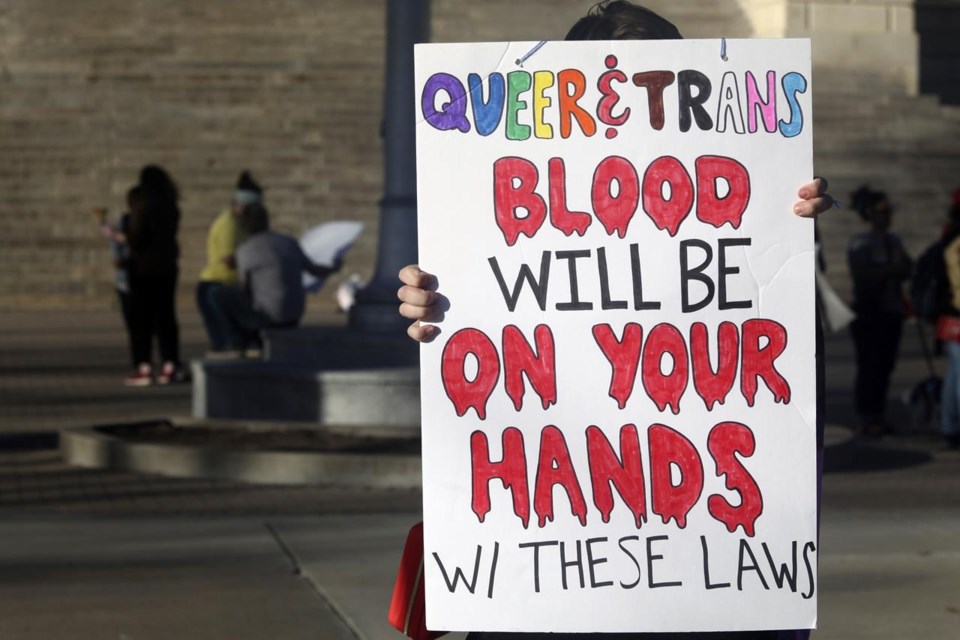TOPEKA, Kan. (AP) — The Democratic governor in Kansas declared Thursday that the state will keep allowing transgender residents to alter their driver's licenses and birth certificates, despite a new law aimed at preventing it.
Gov. Laura Kelly issued a directive that allows agencies under her control to defy a legal opinion issued earlier this week by Republican state Attorney General Kris Kobach, telling them to follow their lawyers’ narrower view of the law.
The attorney general called the Kelly administration's legal analysis “nonsense” and promised, "We will see her in court."
“She is violating her oath of office to uphold Kansas law,” Kobach said a statement.
The new law is set to take effect Saturday and legally defines a person's sex as male or female based on their “biological reproductive system” at birth, a standard that would apply to “any” law or state regulation. Kansas driver's licenses and birth certificates list a person's sex, and Kobach said they can't contradict what doctors assigned at birth.
He also said the state must undo changes in its records — more than 1,200 in the past four years. Lawyers in Kelly's administration rejected that idea, saying the law is not retroactive, according to a background memo from the governor's office.
“Beyond that, it would potentially be impossible for the agencies to comply with the Attorney General’s Opinion due to a lack of complete data,” the memo said.
Kelly, a strong supporter of LGBTQ+ rights, took office in 2019 after defeating Kobach, then the Kansas secretary of state, for her first term. Kobach narrowly won the attorney general's race last year.
An attorney general's legal opinions are not binding on state agencies, and the new law does not specifically mention driver's licenses or birth certificates. Also, in 2019, a federal judge ordered the state to allow transgender people to change their birth certificates to settle a lawsuit over a Republican governor's no-changes policy, and that order remains in effect.
Kelly said in a statement that lawyers for state agencies disagree with the attorney general about the law's "impacts on their operations and will instead keep in place their policies regarding gender markers on birth certificates and driver’s licenses.”
Kansas Senate President Ty Masterson, a Wichita-area Republican, suggested that Kelly was showing her loyalty to “the radical ideology of the extreme left.”
But only a few U.S. states don't allow transgender people to change their birth certificates. Oklahoma and Tennessee policies were upheld earlier this month by federal judges, and a Montana rule is expected to face a legal challenge in that state's courts.
The Republican-controlled Kansas Legislature enacted the new law over Kelly's veto. It also includes provisions to restrict transgender people's use of restrooms, locker rooms and other facilities. At least nine other states have bathroom laws.
Kobach said in his statement: “The Governor doesn't get to veto a bill and then ignore the legislature's override.”
The memo from the governor's office portrayed the new law as toothless because it contains no enforcement mechanism, such as criminal penalties for transgender people who use restrooms associated with their gender identities. It also said administration attorneys don't believe its driver's license policy conflicts with the new law — contradicting what LGBTQ+ rights advocates said throughout the debate.
LGBTQ+ rights advocates said the Kansas law would legally erase transgender people's gender identities, and Kobach's opinion confirmed that it would if the law is enforced as intended. Supporters also acknowledged during a Statehouse news conference this week that they don't see transgender women and girls as women and girls.
The law says “important governmental objectives” of protecting people’s health, safety and privacy justify sex-segregated spaces. It applies to public schools, jails, prisons, rape crisis centers and domestic violence shelters.
State Sen. Beverly Gossage, a Kansas City-area Republican who chairs a committee that handled the measure, said the goal wasn’t to punish people but for women to feel protected in bathrooms and other spaces.
“It’s women feeling safe,” she said.
Kobach also argued that the state law supersedes the 2019 federal judge's order on birth certificates, something strongly disputed by LGBTQ+ rights advocates. Kobach has asked the judge to formally rescind it.
The memo from the governor's office said the new law doesn't affect the judge's order or the policy it created.
The attorney general suggested that keeping transgender people from having state documents or records reflect their gender identities would have little practical effect for them. He said they still could present themselves publicly — and get photographed for driver's licenses — in line with their identities.
But Jenna Bellemere, a 20-year-old transgender University of Kansas student, called such statements “condescending.” She said having an ID that conflicts with her identity has complicated getting through airport security or even using a credit card.
“I’ve had experiences where checking my ID is like, ‘Oh, this doesn’t look right,'” said Bellemere, who changed her birth certificate and driver’s license last year. “I had to stop and be like, ‘No, it’s just a very long story.’”
With the legal climate uncertain, state data shows that four times as many people made changes this year than from 2019 through 2022. The monthly average this year is 58 birth certificates and 27 driver's licenses. LGBTQ+ rights advocates encouraged people to change their documents before Saturday and held seminars to help them.
Adam Kellogg, another 20-year-old transgender University of Kansas student, said Kobach's legal opinion calls for a change in his Kansas driver's license, but his birth certificate from Illinois wouldn't change.
“It’s going to be hard to determine what you should put on my driver’s license because according to my birth certificate, I am male,” he said. “What, are they going to take me in for genetic testing?”
___
Follow John Hanna on Twitter: https://twitter.com/apjdhanna
John Hanna, The Associated Press

